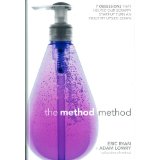Books We Love: The Method Method
Posted in Uncategorized.

Books We Love: The Method Method
This is one of the most enjoyable business books I have ever read. Actually I’m not sure I’d even call it a business book. To me most business books lecture, prescribe esoteric theory and talk at 10,000 feet. It’s like the author never started a business, except for writing business books. (Please send us examples to the contrary!) This book, while about the incredible business called Method that broke into the uber-saturated soap business, is more like a fantastic conversation. You always have the sense that you are hearing from a person, not an author. It’s refreshingly honest, gives practical and useful information, and is really funny.
The book covers the 7 obsessions that are the method to method. According to founders Eric Ryan and Adam Lowry, these are the “rules written by our younger selves, holding us to the ideals we shared when we first decided to launch the company”. The seven range from internal culture to retail relationships, from to commitments to sustainability to commitments to high design. Knowing how vision and intention can get obscured and muddled by the frenetic pace and amount of daily challenges when running a business, it’s great to learn how Method has been successful by not losing sight of their priorities at the heart of their business.
One of my favorite aspects of the book (besides the humor) are the “error autopsies”. In “The Method Method”, these stories of how some pretty big blunders came about and what was learned from them are inspiring because they’re so honest and real. At Dharma we celebrate mistakes in order to create a shame-free environment and not let mistakes take us away from our commitment to oneness and being our best selves. As Rama says, “it’s not about whether or not you make a mistake, what matters is how fast you recover”, and in “The Method Method” we get to learn how mistakes didn’t stop them from forging on. In fact, we learn how these “learning experiences” increased their knowledge of their product, understanding of their customers and commitment to their principles.